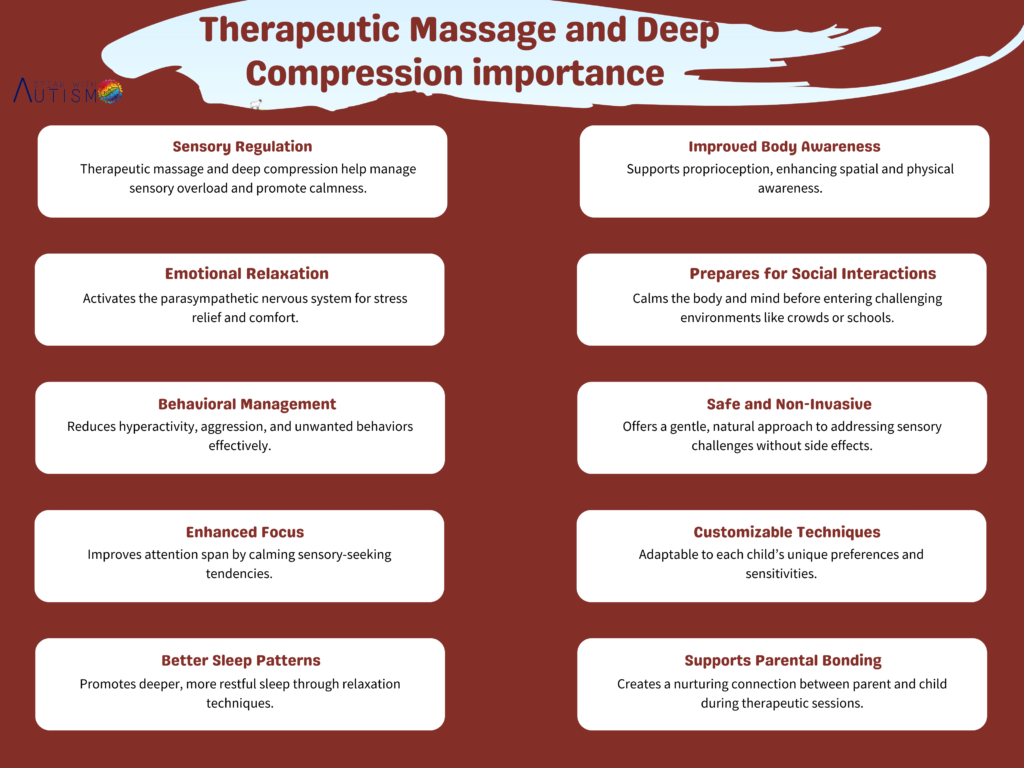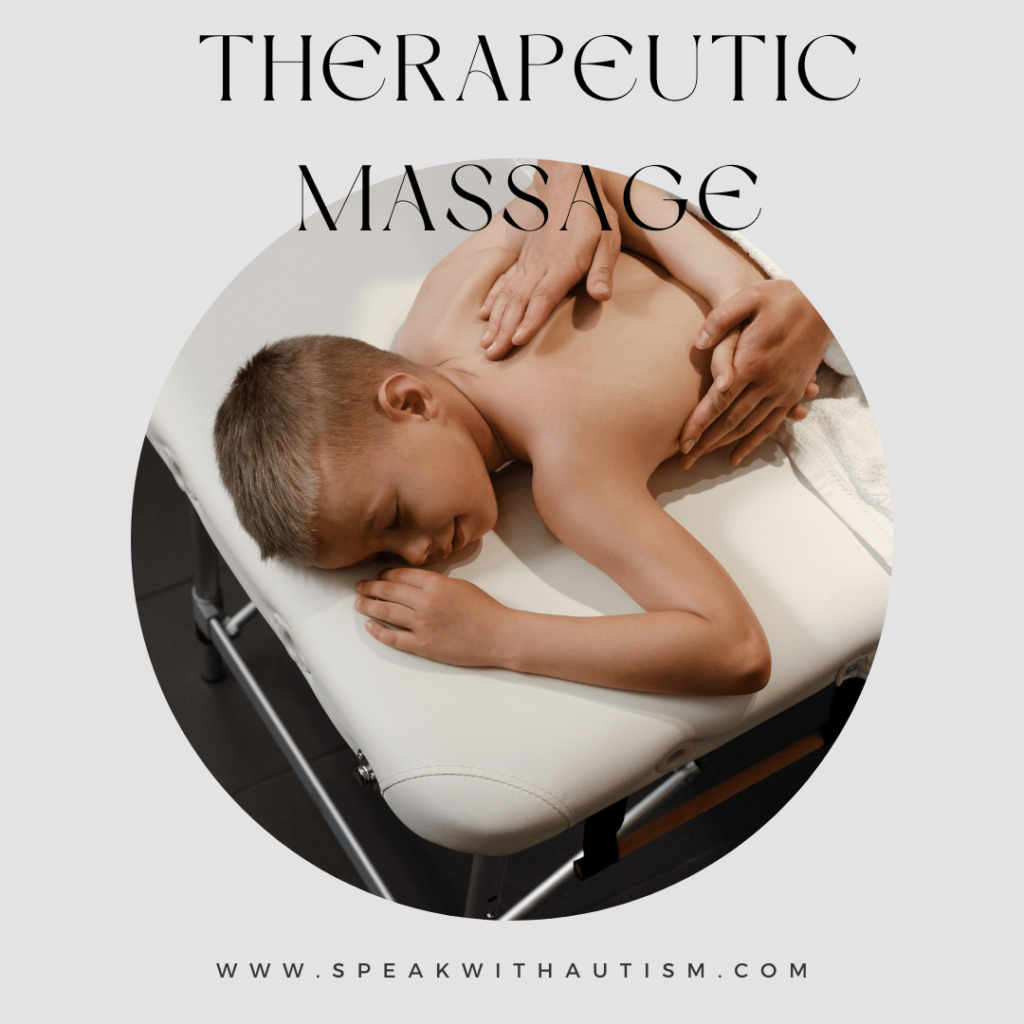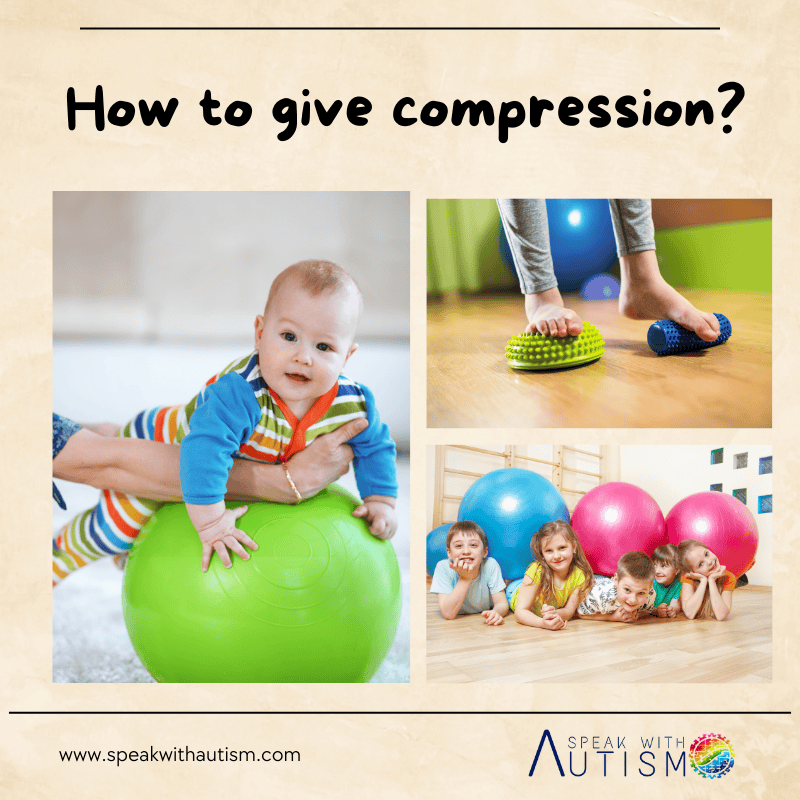Today we will talk about Therapeutic Massage and Deep Compression. Why is it important, how does it work, and what problems of children can it solve. Regular massage and deep compression reduces hyperactivity, sensory unrest and sleep problems of the child.

Table of Contents
Why is Therapeutic Massage and Deep compression important in Autism?
Children suffering from autism often face sensory issues. Whether the child is on the borderline, mild, moderate, or severe spectrum, about 85% of children have some kind of sensory issues. This causes the child’s attention to be distracted again and again, and he remains stuck in “seeking” behavior.
Due to sensory seeking, the child is unable to pay attention to the things you want to teach him. In such a situation, Therapeutic Message and Deep Compression prove to be an excellent solution.
How do Therapeutic Massage and Deep Compression work?
When someone hugs us or presses our hands and feet, we feel a sense of comfort and relaxation. This is because it activates the parasympathetic nervous system.
For children, massages and deep compression:
- Provides proprioceptive feed.
- Reduces sensory unrest.
- Controls their hyperactivity, aggression, and unwanted motor behavior.
- Increases their ability to focus.
- compression helps in improving the behaviour of children.
- Its role in calming children and enhancing their learning.

For which problems is therapeutic massaging and deep compression helpful?
1. Sensory issues:
- If the child is sensitive to a particular sound, texture, or touch, then this massaging is helpful.
- Use a brush, loofah, or soft cloth to solve texture-related problems.
- Children with sensory seeking behaviour.
- Children with hyperactivity and mouthing issues.
- Children with textile needs.
2. Stress and anxiety:
- Children are often hyperactive or in sensory unrest. Massages and compression calm them down.
3. Obsessions and behavioral issues:
- If the child is obsessed with an object, toy, or eatables, then massages and deep compression can control that behavior.
- This behavior is more visible in gardens, schools, or crowded places.
4. Sleep issues
- If the child does not sleep well at night, then massaging can improve his sleep quality.
When and how to massage?
1. Before social events:
- If you know that you have to go to a garden, school, or a social event, then prepare the child in advance.
- Give him 10-15 minutes of gross motor activity (climbing and descending stairs, jumping, or running).
- Give massaging or deep compression when the child is tired, and he or she behaves better.
2. Before sleep time:
- Massage with light hands with oil before sleeping. This will relax the child and make his sleep better.
3. In daily routine:
- If the child shows aggressive behavior in school, then prepare him. Do 5-10 minutes of activity and massage before going to school.
- Also, give deep compression to your child. Example: Applying light pressure on the joints.
4. Ways to massage
1. Use of equipment:
- Rollers: Soft rollers relax the child.
- Brush: Do light massage with a sensory brush.
- Rings: Use rings to apply pressure on hands and fingers.
2. Use of oil or cream:
- Massage with coconut oil or light cream.
- Pay attention to the child’s hands, feet, and head.
3. Use textures:
Massage with textures that the baby is not comfortable with. For example, if the baby dislikes a collar, socks, or any part of the clothing, massage gently with it.

How do you give compression?
- Use of gym ball.
- Weighted blankets and vest.
- Question pillow or mattress.
- compression with a tight hug to your child.
Precautions of compression
- Give it only 45 minutes after eating food.
- Do not put too much pressure on the upper body.
- Do not buy weighted blankets without expert advice.
- All compression and massage techniques were discussed with a child therapist.
What massage tools are useful?
- Wooden rollers
- Loofah
- Acupressure board
- Soft brush
Benefits of Therapeutic massage
- Improved attention and stability.
- Decreased sensory issues.
- Resolved hyperactivity and aggression.
- Improved social behavior.
Benefits of deep compression
- Fulfilling sensory needs.
- Releasing dopamine and serotonin hormones.
- Making the central nervous system functional properly.
- Controlling the fight-flight response.
What to do in an emergency meltdown?
- Do not talk too much to the child.
- Give a tight hug immediately.
- Slowly compress the child.
Conclusion
Therapeutic messages and deep compression bring many positive changes in children. Include it in your daily routine and let us know how effective it improved your child. Compression therapy and Therapeutic massage an effective ways to improve hyperactivity and behavioral issues in children. It is very important to give it at the right time and in the right manner.
Frequently Asked Questions (FAQs)
How to control sensory issues and streaming behavior?
85% of children have difficulty concentrating due to sensory seeking. Therapeutic massage and deep compression activities calm and stabilize them by giving a proprioceptive feed.
How does tiredness and relaxation improve a child’s behavior?
To improve a child’s behavior in crowded places, social events, or school, first give them 10-15 minutes of gross motor activity (climbing and descending stairs, jumping, or running) and massage.
How does deep compression relax the parasympathetic nervous system?
When someone hugs us or presses our hands and feet, we feel a sense of comfort and relaxation. This is because it activates the parasympathetic nervous system. Just as a hug or holding hands gives us comfort, similarly deep compression relaxes children.
How to handle sensory issues and texture sensitivity?
Massage with textures that the baby is not comfortable with. For example, if the baby dislikes a collar, socks, or any part of the clothing, massage gently with it. Use things that children do not like for massage. If the child is sensitive to a particular sound, texture, or touch, then this type of massaging is helpful
Why is therapeutic massage important?
Children with autism often experience sensory issues. Massage and deep compression help regulate sensory input, promote emotional control, improve sleep quality, enhance social focus, and manage behavioral challenges, providing them with relaxation and a sense of peace.
